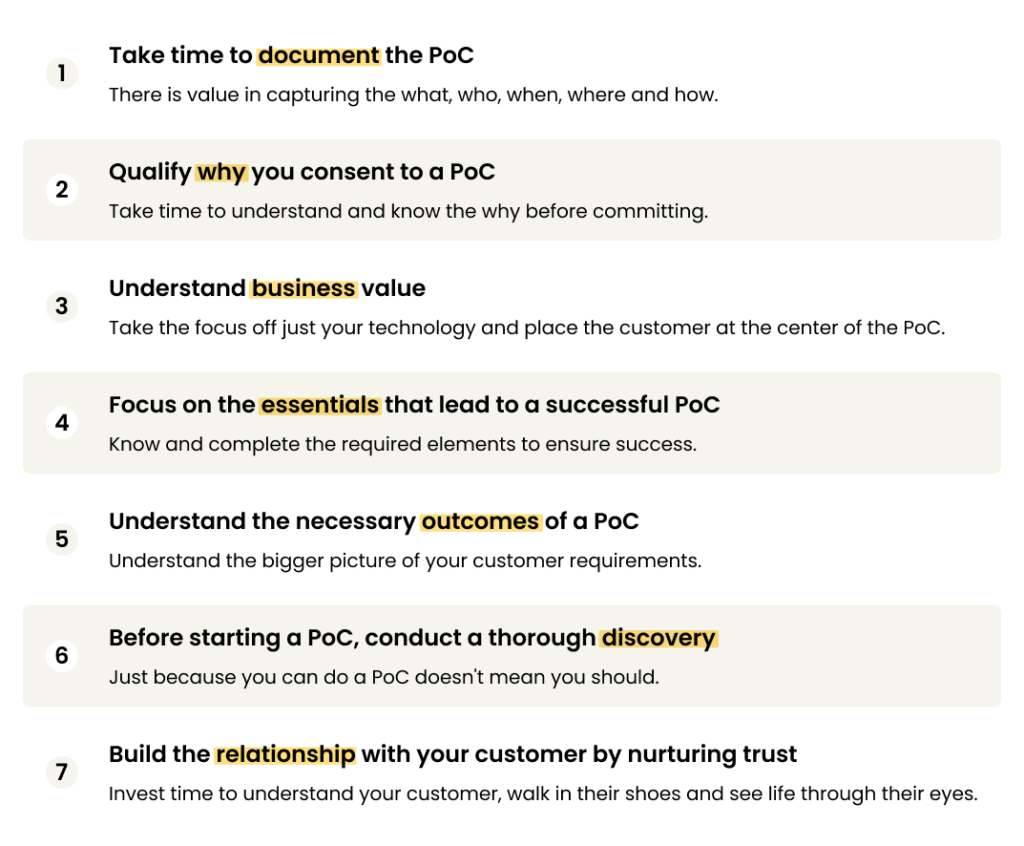Everyone wants the “stamp of greatness” for their work. Especially for those in the presales profession where so much of the value you provide is tied to your credibility. This affects so many parts of your job, but especially when being asked to provide an Evaluation or Proof of Concept (PoC).
Being able to organically consider every stakeholder’s priorities while naturally speaking about your solution is a skill that takes time to cultivate. That’s why I wrote the Seven Habits of Impactful Evaluations. This ebook outlines a set of habits I’ve found to improve the collaboration and win-rate of a PoC. This ebook is a companion to the mindset and practices I outline in my book entitled The Essential Guide to Navigate Your Proof of Concept.
Why Focus on Evaluations?
As a staple of an SE’s responsibilities, a PoC helps a customer understand the value and capabilities of the solutions you are representing and of your organization as a whole. When PoCs are done well, they become the vehicle that drives value and helps move the needle towards a win. They should capture the customer’s imagination so they see the full vision of how the implementation of your solution addresses and improves their business situation.
While PoCs are part of most Solution Engineers’ functions, for many, this task is one that SEs dread. Even those that execute a PoC well, they tend to dislike even talking about PoCs. But just like turning on a light makes scary shadows disappear, learning the best practices for a PoC removes the dread that is often associated with evaluations.
Conquering Evaluations
Evaluations are tricky, requiring lots of planning and strategy. There are many stakeholders involved and each of their unique perspectives need to be taken into account when creating a PoC. You also need to present the information in a way that is genuine and engaging. If this sounds like a tall order, it is, but there are practices you can develop that will make the PoC process less painful while increasing your win-rate. Some of those practices are found in the Seven Habits of Impactful Evaluations.
The seven habits aren’t technology focused, instead they focus on uncomplicated best practices that build mutual respect, active listening, and collaboration into the PoC process. These habits also don’t require a huge overhaul to any systems you already have in place. They are applicable to any sales process, team structure, and technology solution.
The Seven Habits of Impactful Evaluations
Adopting these habits are techniques to aid you in improving the human interactions with a customer during a PoC or evaluation.

These habits are not meant to be a step-by-step guide for completing evaluations. Rather, these habits are intended to facilitate and open natural conversations with your customer so that you can advance the evaluation and sales process.
SEs can sometimes become rigid or monotonous when speaking about topics you’ve covered a hundred times before and that can annoy or even dissuade customers from continuing discussions. Often the focus in a PoC is primarily on the technology – which is fine – but the seven habits draw in human elements. This is a good balance and important to maintain a collaborative and engaged PoC engagement.
Although you’re managing complex technology, you don’t need to act like a robot yourself. Incorporating these practices will help you build trust and rapport with your customers as you move them through their buyer journey.
While this list provides the framework for the seven habits, my ebook Seven Habits of Impactful Evaluations provides further insights and more in depth explanations of how to establish these practices into your everyday operations.
If you wish to dive deeper in the everyday issues and practices to manage evaluations then take a look at my book entitled The Essential Guide to Navigate Your Proof of Concept.
If you or your team require further training, consulting or coaching around evaluations then visit my website to review the POC Essentials service designed to improve the win-rate of evaluations for presales professionals.
The Moments that Matter Most
While these habits are great tools for crafting your evaluations, they won’t necessarily move you through the process in a logical sequence. Much like using road signs and markers to track where you are geographically, there are four milestones in PoC that will ensure you’re headed in the right direction.
I’ve outlined the milestones of the PoC process that lead to the best outcomes:
- Qualify
- Define
- Execute
- Close
Each milestone outlines the practices you should employ for that stage and outcomes you should look for to make sure your evaluation is the best it can be. To find out more, look for the next blog in this series.
PoCs or evaluations shouldn’t be a daunting task or something you rush through to check the box. When done correctly, PoCs are a tool that bolster your credibility with the client and smooth the path to closing a deal. Use them as an opportunity to show the customer your solution can deliver on its promises and the benefits they’ll gain once they get through implementation. Even if you’re not a fan of performing evaluations, it’s important to have the skills necessary to carry them out successfully. Developing the habits to help move through the conversation naturally and following the milestones to ensure everything is one track will make each PoC easier for both you and your customer.
